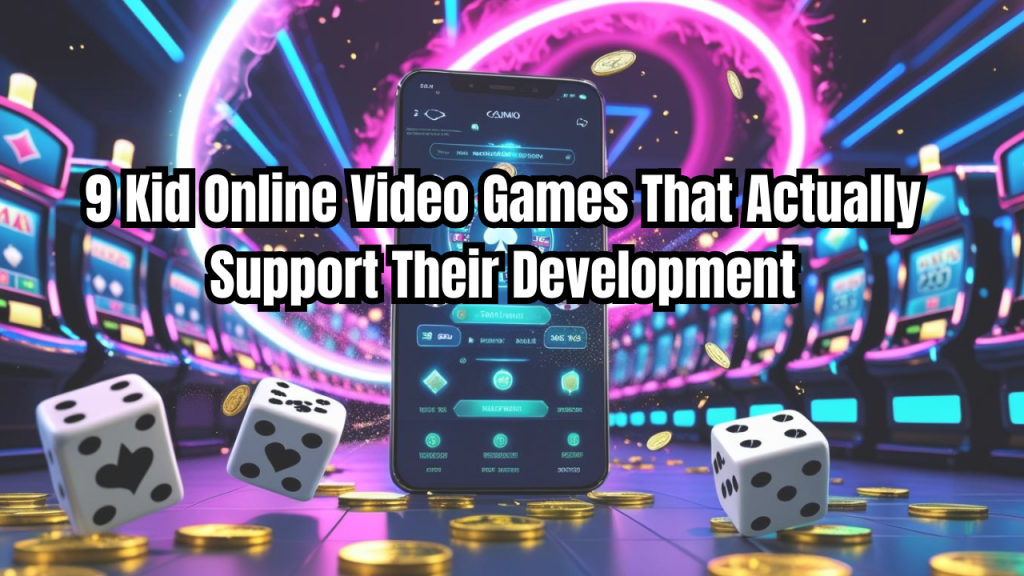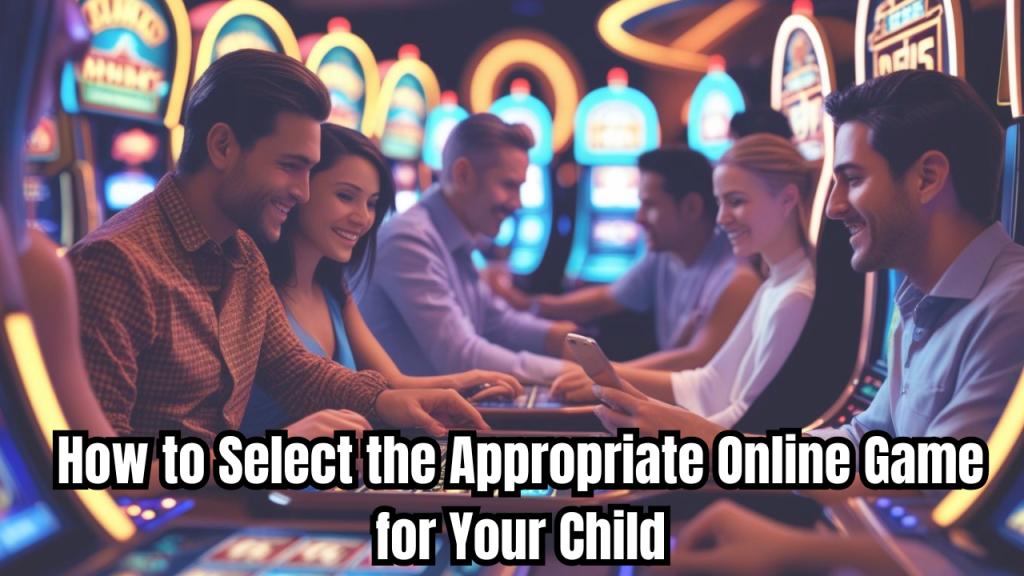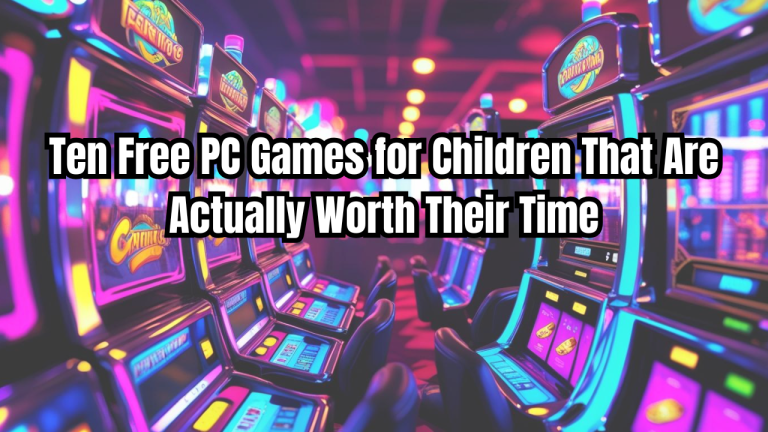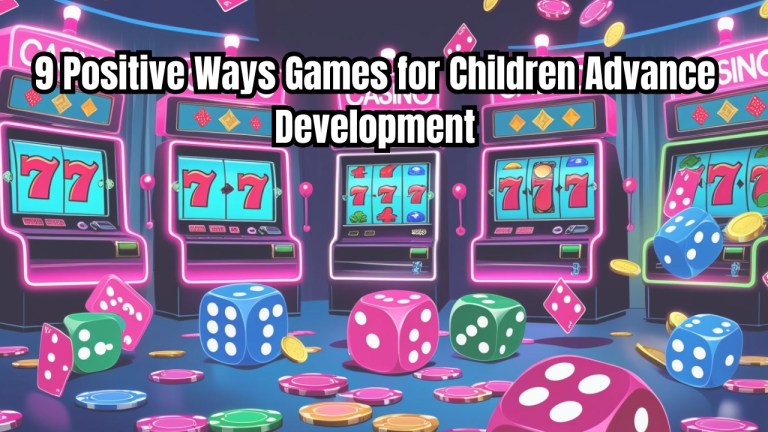Every parent knows the pause before responding to the inquiry: “Can I play a game online for a bit?”
When it is a board game on the dining table or tag in the backyard, it is a simple “yes.” Regarding onlonline video games for kids games, the response is sometimes guilt, uncertainty, and concern mixed with hesitation.

You are not by yourself, though. The truth is that what your child is playing determines whether or not online games are the issue.{
Why Should We Treat Online Games for kids More Respectfully?
There are many different points of view on children and screens. To be honest, some of the criticism is reasonable—mindless games with ads, hyperstimulation, and minimal instructional value are still far too common.
On the other hand, the reverse This is encouraging. Working together to produce games that are designed to teach, engage, and even heal are game developers, teachers, and child psychologists.
9 Kids’ Online Video Games That Get It Right
I have years of looking at games from both a parenting and an educational perspective. These nine really stood out as smart, safe, and shockingly pleasant.
1. Prodigy
Best for ages six to twelve; math
Imagine this: your child has to solve a math problem in order to start a spell while they are battling a firebreating dragon. In a nutshell, that is Prodigy. Designed for your child’s grade level, this mathbased adventure online games for kids therapy
Children believe they are engaged in a game, thus it is a win. You know they work on arithmetic.
2. Minecraft: Education Edition
Best for those 8+; subjects: science, history, teamwork
Not only another Minecraft obsession; this one is meant for learning and classrooms. From designing renewable cities to dissecting the human body, openworld play becomes discoverybased education.
actual development: It teaches systems thinking, planning, and group projects.
PBS Kids Games 3
Best for three to eight years; subjects: reading, math, social skills
Your child will love this one if they brightens upon seeing Elinor, Daniel Tiger, or Xavier Riddle. Built on learning objectives, these short games have no advertisements or risky links.
Bonus: Your children can trust the source as well.
4: Scratch
Best for 7–14 | Subject: Coding
Designed by MIT, Scratch lets children create their own visual coding block animations and games. It’s as if learning creativity and logic concurrently.
Why it’s strong It enables children to be makers rather than only tech consumers.
5. Tysker
Subject: Coding, Game Design; Best for ages 8–13
Tynker picks up where Scratch leaves off, adding more regimented coding courses and real programming languages including Python and JavaScript.
Children pick up a practical ability they can use for years.
Kodable
Best for ages five to ten; topic: early coding skills
Level of engagement: brilliantly vivid, entertaining characters with just the correct degree of difficulty.
Kodable covers logic, patterns, and sequencing—all the foundations of programming—for younger students who are not ready to write code.
National Geographic Kids online games for kids , 7
Best for ages six to twelve | Subject: Science & Geography
These games transport one to a planetarium or safari. Even the most inquisitive children will find real facts, trivia, and minigamesonline games for kids packed here to satisfy them.
Why it’s different: It sensibly connects your child to the real world.
8. BrainPOP / BrainPOP Jr.
Best for ages 6–14; subjects: science, history, arithmetic, more.
These sites combine interactive online games for kids girls and quizzues with short videos. Younger children would find the Junior version perfect; the main version delves further into academic areas.
What’s great: It transforms school subjects into easily consumed, enjoyable learning opportunities.
7. Lightbot
Best for 8 to 13 years | Subject: Logic and Programming
Though Lightbot seems to be a basic puzzle online games for kids educational free , it is subtly teaching your child programming ideas. Children teach a robot commands, so learning without even realizing it.

Best part: It, in a playful manner, sharpens reason and problemsolving.
How to Select the Appropriate Online Game for Your Child

Given so many choices available, deciding on the correct game can be daunting. This approach keeps things straightforward and clever:
1. Ask: What Out of This Do I Want My Child to Get?
Are they working on a schoolrelated topic? pursuing a passion? Or perhaps just trying to unwind? Knowing your purpose helps sort the noise.
2. Search for Age Appropriate Reviews and Attitudes
Beyond the rating of the app store, seek parent and teacher reviews discussing content depth and safety.
3. You Play It Yourself
Though it sounds boring, it is well worth it. More than any description could ever say, five minutes of gameplay can reveal.
4: Track Involvement
Does your child actively think or zoning out? The best games test them just enough to keep them motivated without aggravation.
5. Establish sensible boundaries
Not even the finest games should run endlessly. Treat them as a tool rather than a babysitter; use physical play, reading, and offline creativity to balance.
FAQs: What Parents Often Ask About online video games for kids
Q: Can video games really help my child learn?
Absolutely. When they’re designed with intention, games can reinforce school skills, boost critical thinking, and even teach empathy.
Q: What if my child only wants to play games?
That’s common—and not always bad. Use it as an opportunity to guide their interests. If they love Minecraft, get them into building challenges or history worlds. If they love coding games, let them try creating their own.
Q: How can I protect them online?
Use parental controls, stick to games without open chat, and find direction on sites like Common Sense Media.
Q: Should I avoid multiplayer games altogether?
Not always. Some multiplayer games (like Minecraft Education) can be great for teamwork. Just be sure the game has moderation tools and your child knows the rules of digital safety.
conclusion
Making smart choices about online games might help you improve while you spend time on screens. When kids play online games for kids educational with the correct leadership, they may safely and purposefully explore, learn, and create. Recognise the potential, set limits, and stay involved together







